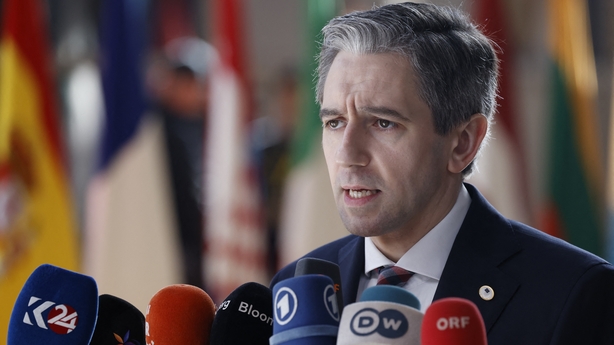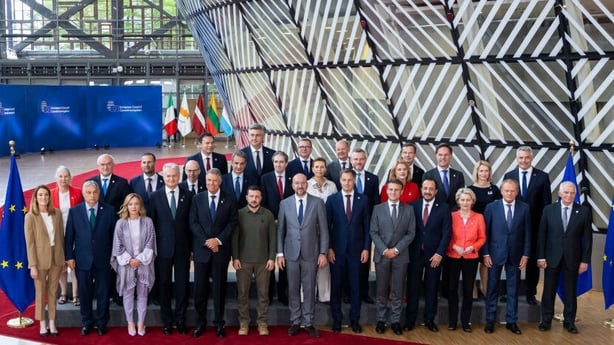European Union leaders have agreed to nominate Ursula von der Leyen for a second five-year term as president of the European Commission.
At a summit in Brussels, they also chose former Portuguese prime minister Antonio Costa as the future chair of their European Council meetings and selected Estonian Prime Minister Kaja Kallas as the next EU foreign policy head.
The leadership package represents continuity for the bloc, with centrist pro-EU factions keeping hold of the top positions despite a far-right surge in elections to the European Parliament earlier this month.
The deal was announced by current European Council President Charles Michel on social media.
The trio won broad backing from leaders but diplomats said right-wing Italian Prime Minister Giorgia Meloni abstained from the vote on Ms von der Leyen and voted against Mr Costa and Ms Kallas.
Ms Von der Leyen's nomination still needs approval from the European Parliament in a secret ballot next month - widely seen as a trickier proposition than her endorsement by EU leaders.
Earlier, the Taoiseach suggested that Fianna Fáil MEPs should think of the national interest when considering whether or not to vote for Ms von der Leyen.
There is an agreement between the three main centrist groups within the parliament to support her.
She will need 361 out of 720 votes, but there are fears that dissenters will whittle down her margin of victory.
Fianna Fáil's four MEPs are expected to vote against Ms von der Leyen's confirmation, according to comments made during the European election campaign.
Arriving at the summit, Mr Harris said Irish MEPs should reflect on the ability of the Government's European Commission nominee Michael McGrath to secure a senior portfolio if they do not back her.
"I think it is helpful, now that we have sight of our nominee, for MEPs to reflect on that as well and how they can assist Michael McGrath and assist Ireland in getting the best portfolio possible," he said.
The coalition has stressed publicly that Ireland is hopeful that, as a minister for finance with a significant EU profile, Mr McGrath will get a strong economic portfolio.
However, it is understood there is unease within the Government that the public declarations during the election campaign by Fianna Fáil candidates that they would vote against Ms von der Leyen, due to her position on the Gaza war, could damage Ireland’s - and Mr McGrath’s - standing when the next commission is being formed.
Ms von der Leyen will only start formally approaching member states to put forward their nominees after her own candidacy has been endorsed by the European Parliament.

One Government source suggested that Fianna Fáil MEPs voting against her would be like a coalition partner demanding the finance ministry but then saying they would vote against the government.
It is understood it is a delicate issue for the Taoiseach given that the MEPs are all Fianna Fáil members and that he does not want to be seen to be putting pressure on them.
Both Simon Harris and Tániste Micheál Martin have said they would prefer a "step by step" approach to Ms von der Leyen’s confirmation, beginning with the European Council move to support her nomination today.
Sources point out, too, that there is an agreement at EU level between the European People’s Party (EPP), where Fine Gael sits, and the liberal group Renew, of which Fianna Fáil are members, that she be chosen for a second term.
Meanwhile, the Taoiseach confirmed that the Government would only be putting forward one nominee to be Ireland's next European commissioner, and would not provide a female candidate alongside Mr McGrath.
Mr Harris said that EU treaties were clear that a member state was only obliged to provide one nominee, and that Mr McGrath would be judged on his merits.
Ms von der Leyen asked each member state for a male and female candidate in 2019, and is expected to make the same request this time around.
Mr Harris told reporters: "I have huge respect for President von der Leyen. I also have huge respect for the treaties. The treaties are very clear that it's a matter for a member state to decide who wishes to nominate.
"It's perfectly within the President's rights to indicate her views and preferences ... but our government has made the decision. We have decided to send one of our most senior politicians, one of our most senior ministers, our finance minister, and we won't be deviating from that."
The Government will also support the nominations of Mr Costa and Mr Kallas.

At the summit, the bloc also signed a security agreement with Ukraine, debated how to bolster its defences against Russia and agreed strategic priorities for the next five years.
Investment in defence is part of the EU's "strategic agenda" - a document that tells its institutions what governments want them to focus on during their 2024-2029 term.
Apart from defence, the agenda calls for a more competitive bloc to withstand economic pressure from China and the United States and for preparing it for enlargement that would include Ukraine, Moldova and the western Balkans.
Additional reporting Tony Connelly

